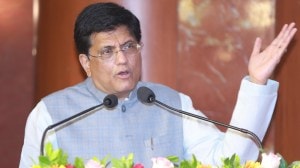What does Advani146;s future hold?
In his fifth term as BJP president, L.K. Advani faces the biggest challenge of his political career. He was not left with any option but to ...

In his fifth term as BJP president, L.K. Advani faces the biggest challenge of his political career. He was not left with any option but to take over, and did not look particularly happy to begin with, on the day Venkaiah Naidu gave up the job. Though Advani and Vajpayee were seated on the dais, neither of them spoke, which was surprising.
If insiders are to be believed, the Sangh leadership was keen on Murli Manohar Joshi for party president and might have suggested his name following its meeting at Hardwar, where its Akhil Bharatiya Karyakarni is meeting in the first week of November. The RSS considers him strong on both ideology and organisation and he is a good speaker. During his stint as HRD minister, Joshi had kept in close touch with the Sangh and took decisions which endeared him to the RSS.
Getting a whiff of this, 8220;young turks8221; in the party, including Arun Jaitley, Bal Apte and Sanjay Joshi, moved in for a preemptive strike. They roped in Jaswant Singh and with him they went to see Vajpayee who agreed to the idea. An ailing Madan Das Devi was rushed to Delhi from Mumbai and it was he who broke the news to the Sangh leadership in Nagpur that Naidu wanted to step down immediately and that there was consensus on Advani8217;s name.
Since the BJP8217;s Lok Sabha defeat, the Sangh has been insistent that the BJP must go in for a course correction. Advani was keen that Naidu continue, though he had begun to play a more active role in party affairs and was allocated Pramod Mahajan8217;s old room. But the Hardwar conclave and the Maharashtra results fast-forwarded the change of guard.
In his first week as president, Advani has indicated the different elements 8212; the Sangh, sections of the BJP and NDA allies 8212; that he will have to take along. First, he put Jaswant Singh and Mahajan on either side of him at his press conference not Arun Jaitley, and Sushma Swaraj was not even present. The message was clear. Jaswant to give the image of moderation, Pramod to signal that he would not be singled out for the Maharashtra defeat. An unhappy Mahajan could have been a nuisance. He found himself handling the media on behalf of Advani. Naidu was crucified for all the ills that beset the BJP, and coming when the resignation did, it let Mahajan off the hook.
Advani8217;s first port of call was Nagpur, where he attended the Vijayadashmi celebrations in the role of 8220;a swayamsevak8221;; then he conferred with K. Sudarshan on the direction the BJP should take, and affirmed the party and the RSS were 8220;inseparable8221;. His next destination was Hyderabad to meet ally Chandrababu Naidu.
With the dilution of both 8220;ideology and idealism8221; during the BJP8217;s six years in power, Advani is no longer the darling of the Sangh he used to be. The VHP8217;s criticism of him reflects this. The first task before him will be to win the approval of Sangh leaders and keep them in good humour. He will also have to tailor the party to the demands of an increasingly young and changing India, and not lose the BJP8217;s allies.
Though at a personal level, Advani has had a very good rapport with Chandrababu Naidu, Jayalalithaa, George Fernandes and Nitish Kumar, going back to Hindutva in one form or another, to prove his bonafides to the Sangh, could queer the pitch with the allies. Of course, he will try to marry Hindutva with development, and he tried to articulate this at his press conference when he used the term 8220;bharatiyata8221; nationalism in its place. But will it work and will it have an appeal? India of 2004 is after all not the India of 1990.
It is not going to be easy for Advani, and Mahajan is right when he says that the BJP is facing its toughest challenge. Given his stature, the moral authority he wields in the party and the acceptance he has amongst the second rung leaders, Advani8217;s elevation will stem demoralisation and stop any defection from its ranks that might have taken place. What will be difficult is the fact that the Sangh will have higher expectations of him than they had of Vajpayee and the allies will view him with greater suspicion than they did Vajpayee.
The BJP has little chance of winning the state elections that are due in the next two years, which might have enabled Advani to demonstrate the revival of the party under his stewardship. Its prospects are not great in Bihar, Jharkhand, Haryana, which go to the polls in 2005 or in Tamil Nadu, West Bengal and Kerala, a year later.
The party8217;s real challenge will come in Uttar Pradesh in 2007. The BJP came third or fourth in many of the recent UP bypolls, and this is a frightening prospect for the party. Besides, Vajpayee and Joshi have more appeal in UP. In 2007 elections will be due for the party presidency, and he who gets the crown will lead the party in 2009. At the end of the day, the success or failure of L.K. Advani could depend on the UPA, and the mistakes it makes.
- 01
- 02
- 03
- 04
- 05































